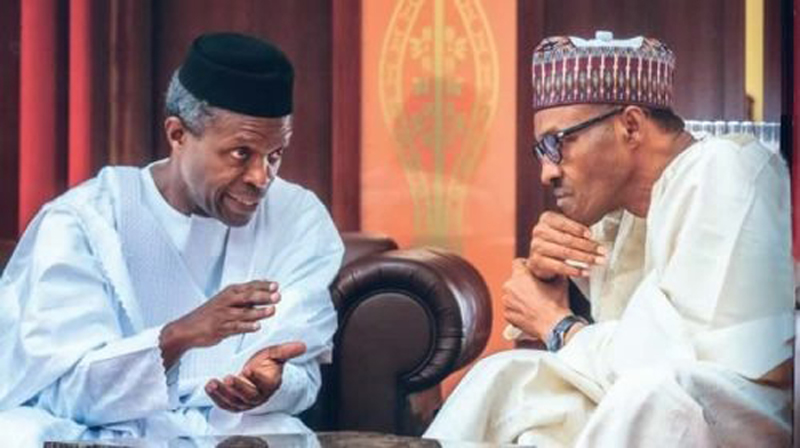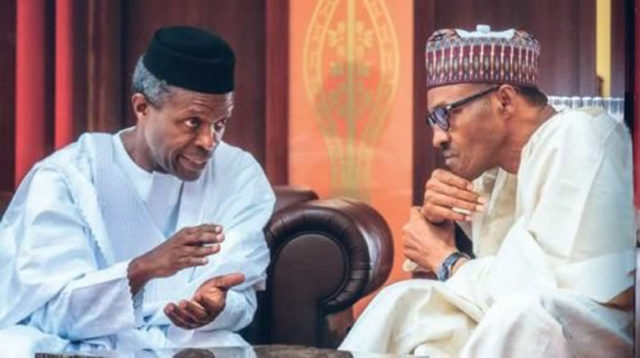 It’s quite straight forward, we will let the figures do the talking.
It’s quite straight forward, we will let the figures do the talking.
When Buhari’s APC-led government took over in 2015, Nigeria’s unemployment rate stood at 7.5%; as of the end of the third quarter of 2016, when the last report was made available, the unemployment rate had gone up to 13.9%. In 2015, the inflation rate was a single digit at 9%; in April 2017, it was 17.24%.
Those are not all the indices to rate Buhari’s economic performance. In 2014, the total worth of goods and services produced in Nigeria, known as the gross domestic product, GDP grew by 6.22%; in 2015 when the Buhari’s government took over, it grew by 2.78%. In 2016, it contracted by 1.5% – ushering Nigeria into its first economic recession in 25 years.
But those parameters are not what Buhari’s government wants Nigerians to focus on. In a speech delivered by his deputy, Yemi Osinbajo to mark this year’s democracy day, the president beats his chest enumerating the successes of his government over the past two years.
He boasted about the gains of in the fight against corruption – how billions of naira had been recovered; the investment in fertilizer production to boost activities in the agricultural sector and the bailout packages offered to States to pay salaries.
But some Nigerians who spoke to Bounce News think otherwise.
“Their economic policies have been a fiasco. How does someone like me begin to assess Buhari’s government? First, I lost my job just few months after he took office due to his policies that caused my company to downsize. And I have not been able to secure another since then. You don’t want me to start telling you how tough things have been,” said a former banker who did not want his name mentioned.
According to him, “It does not matter how much the people in government try to explain away the cause of the hardship that people face today. The truth is that they have failed the people who voted and caused them untold misery. But they still have two more years, to prove to Nigerians that they have anything good at all to offer.”
“If I am to assess Buhari’s economic policies over the past two years, I will score him 4% should I rate him on a scale of 1 to 10,” started James Ezechukwu, a web developer and entrepreneur.
He said: “The reason is simple. We have all seen how things have turned out in the past two years. First, our image really got tarnished by President Buhari’s utterances outside the country.
“That was never a diplomatic way of representing your country. You cannot go to a forum where other countries’ presidents are selling their countries and economic viabilities and you go there talking about how corrupt your country is.”
He added: “We are definitely not the worst country in the world. Of course, that backfired, and it greatly has affected foreign investment. Things have not been this bad. Now, everyone is struggling. What about all those policies on importation and foreign exchange that have killed businesses and stifling economic growth today?”
A trader, Stan who also spoke to Bounce News said it is surprising that it is only 2 years that Buhari’s has spent in office.
“It feels like ages, the time this government has been in power. Things are just getting harder. And when I thinks, I begin to wonder if Buhari and people who are ruling with him do not go out to see how people are suffering?”
On the flip side, some measures have been put in place to halt the downward trend – the government targeted the structural causes of the inflation by releasing over N770 billion in the 2016 fiscal appropriation for capital projects in key sectors of the economy.
These include: power, works and housing, interior, transport and agriculture.
Another amount of over N400 billion was also released for social intervention programmes designed to impact the lives of the vulnerable segment of the population.
The social intervention programmes the payment of N5, 000 stipend to the most vulnerable people in the society and funding the schools feeding programme, designed to generate a lot of economic activity in local government areas.
Professor Osinbajo says about 500,000 jobs have been created through the N-Power initiative and the government policies are focused on empowering the nation’s youth which are obviously the majority.
Perhaps the government will have the tenacity to see through its plans to revamp the economy in less than 24 months.
I would also like to ask two questions – why are the agencies of government not working together to promote a coherent policy position with clear timelines, targets, indicators of success and measurable goals?
Are we in situation where all people are equal but some appear to be more equal than others?
Courtesy: BOUNCE








The Buhari administration promised a lot to the people of Nigeria during their campaign, yes the process is slow but it’s gradually tilting towards an achievement, if none at all at least the fight against corruption is visible and the Agricultural stability we are soon going to be independent of other countries for food.
Buhari has been a total disaster and a lame duck president
I don’t think the Buhari administration has done much. Were is the light they promised us